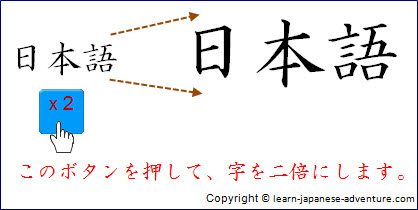- Home
- Intermediate Lessons
- Japanese Grammar Make Action
Japanese Grammar: Make Action with
~くします/~にします -
Intermediate Lessons: 31
In this lesson, you'll learn a new Japanese grammar using くします (ku shimasu) or にします (ni shimasu).
As you have already known, する (suru) or します (shimasu) means "to do (something)". It's normally connected with a noun to form a Group 3 verb.
For example, 勉強します (benkyou shimasu) means "to study", 洗濯します (sentaku shimasu) means "to do laundry".
It can also be combined with い-Adj, な-Adj or Noun to have another meaning which is what you are going to learn in this lesson.
Sentence Patterns
Let's see what are the sentence patterns...
| い-Adj (~ |
します |
| な-Adj に | します |
| Noun に | します |
This grammar indicates that someone "turns" or "makes" something into a certain condition or state.
For い-Adjective, you first change it into its adverbial form by replacing the い (i) with く (ku), and then connect it to します (shimasu).
Whereas for な-Adj and Noun, append the particle に (ni) and then connect to します (shimasu).
Examples

|
1. |
音を 大きくします。 |
|
2. |
部屋を きれいにします。 |
|
3. |
砂糖の量を 半分にしました。 |
|
4. |
このボタンを押して、字を 二倍にします。 |
|
5. |
ズボンが長すぎますから、短くしたほうがいいですよ。 |
|
6. |
赤ちゃんが寝ていますので、テレビの音を 小さくしてください。 |
|
7. |
冷房をつけて、部屋を 涼しくしましょう。 |
|
8. |
テープを聞いて、発音を よくしたいと思います。 |
|
9. |
値段はちょっと高いです。少し 安くしてください。 |
Differences between ~くします/~にします and ~くなります/~になります
| い-Adj ~ |
なります |
| な-Adj に | なります |
| Noun に | なります |
Many people get confused about this Japanese grammar ~くします/~にします with another similar grammar ~くなります/~になります.
While ~くします/~にします indicates that someone "turns" or "makes" something into a certain condition or state, ~くなります/~になります indicates that something "becomes" a certain condition or state.
The main difference is that ~くします/~にします involves a person who make the action, whereas ~くなります/~になります just describes the change in condition or state.
Let's use some examples to explain the differences between these two Japanese grammars.
|
1. |
洗濯をしました。ズボン が 短くなりました。 |
|
2. |
長すぎましたから、ズボン を 短くしました。 |
In example 1, I didn't physically do anything to shorten the trousers. It becomes shorter naturally after the washing. ~くなります is describing the state of the trousers.
In example 2, the state of the trousers is the same - becomes shorter. However, this change is made by me on purpose. I made the trousers shorter because it was too long.
Another difference to take note of is the particle used in the two Japanese grammars. For the first example, it just describes the state of something with くなります, therefore the particle が (ga) is used.
But when a person is involved for the change of state in the second example with くします, the particle を (wo) is used.
Another Example
Let say that you visit your friend's house and are having dinner with the family. Your friend's mother serves you a big bowl of rice.
You want to reduce the amount of rice as you know you cannot eat that much. How do you make the request?
The correct way to say it should be...
- 食べられませんので、ご飯を 少なくしてください。 O
taberaremasen node, gohan wo sukunaku shite kudasai O
Meaning: As I cannot eat that much, please reduce the amount of rice.
If you were to use くなります, like the following...
- 食べられませんので、ご飯を 少なくなってください。 X
taberaremasen node, gohan wo sukunaku natte kudasai X
...this is totally wrong. You are thinking somehow like magic, the rice will become less by itself.
Selection/Decision: Noun に します
There is another meaning for the Japanese grammar Noun に します (Noun ni shimasu). It can also express a selection and/or decision.
Let's look at some examples...
|
1. |
会議は水曜日にします。 |
|
2. |
旅行の目的地は北海道にしました。 |
|
3. |
部屋はツインにしましょう。 |
|
4. |
飲み物はコーヒーにしますか、お茶にしますか。 |
|
5. |
A: ドレスはどんな色が好きですか。 |
Related Page
Lesson 6: ようになる you ni naru.
Ready Set Speak Sale! Get up 40% OFF Forever Discount on Premium or Premium PLUS plan! Ends on 19 April 2024
The link above is an affiliate link, which means that I would earn a commission (at no extra cost to you) if you do end up purchasing the related learning course.
Previous - Lesson 30: Japanese Expression Suggestion & Advice
Next - Lesson 32: Japanese Demonstrative Expression using そ and あ
Buy me a coffee








Facebook Comments
Don’t see the comments box? Log in to your Facebook account, give Facebook consent, then return to this page and refresh it.